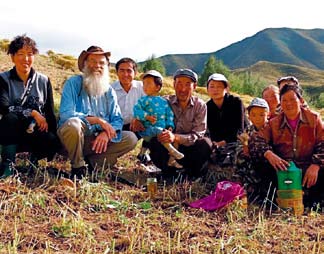

Ian Riley
The University of Adelaide, Australia
Exchange to Institute of Plant Protection, Mainland China
Experiencing life and work in China for more than just a few days or weeks íV all that 10 plus earlier visits allowed íV had become a dream, if not an obsession. It held top billing on my bucket list. So, with the support of an Endeavour Australia Chueng Kong Fellowship, in July 2008, that dream became a reality. Sadly, the time is nearly over, and soon the dream will be just a memory, though a good and unforgettable memory.
The time has been well spent undertaking collaborative research on cereal cyst nematode (CCN, Heterodera avenae), a yield limiting root parasite of wheat and related cereal crops. My hosts have been Professor Ma Ping and Dr Chen Shulong of the Institute of Plant Protection in Baoding, Hebei. Fieldwork focused on spring cropping areas of the Tibetan Plateau in Qinghai, working with Ms Hou Shengying of the Institute of Plant Protection in Xining, Qinghai, with some support from the Qinghai Foreign Experts Administration Bureau. The work was done as an unpaid volunteer, representing the School of Agriculture Food and Wine, University of Adelaide as an honorary member of the academic staff. The aim has been to examine spatial distribution of CCN populations densities, and the contribution of crop rotations, in cereal crops at a village scale. Farming families in these villages grow wheat (or barley), potato and broad bean for subsistence, with cash being generated by rapeseed and some animal production. Improved yield and reliability of their cereal crops would allow the farmers to reduce plantings and grow more cash crops. Family incomes are low and being able plant more cash crops would be a significant advantage.

The current focus on CCN in China arose from an ATSE Crawford Fund Master Class on Soil Borne Pathogens of Wheat held in Zhengzhou in 2005, in which I was a trainer.
During the class, fields in 4 provinces were sampled for CCN to discover that the nematode was more common and at higher densities than anticipated. This stimulated survey, yield loss and other studies in winter wheat in the provinces responsible for most wheat production in China (Henan, Hebei, Anhui). It became evident that CCN occurs nearly everywhere winter wheat is grown and is the cause of significant damage. However, less is known about the situation in spring wheat. Total spring wheat production is much less and tends to be subsistence production, so not as significant for the country but of vital significance for farming communities that depend on it for their daily food. The field and lab work complete, data analysis provided some interesting insights to CCN in spring wheat areas. On first pass, there appeared to be no relationship between the preceding crop and final population densities in wheat, barley or oats, even if the preceding crop was a host for CCN. Any rotational effects were masked by strong spatial variability and high levels of hyperparasitism (parasites of parasites). Some fields had remarkably large numbers of empty cysts, indicating a history of infestation, but no cysts with mature eggs were found. However, it was easy to find parasitised cysts and many of the empty cysts were small, presumably because young females had been parasitised. Despite this, a significant number of fields had egg densities over 10 and up to 60 eggs/g soil. So it seems that the natural biocontrol does not provide full protection. Yield loss studies are in progress and if CCN is shown to be problematic, there would be clear justification for introducing suitable resistance to adapted cultivars and to learn more about what factors promote natural biocontrol.
A report on the findings was well received by leaders and others in the Qinghai Institute and it is hoped that this work will stimulate on-going support for research on this problem and then eventually to real improvements for farmers. A paper for publication, with my collaborators as co-authors, is nearing completion. I anticipate being able to provide ongoing encouragement for further research, and perhaps even help in securing funds from international donors.
Coming from an Australian research background and attempting to achieve worthwhile outcomes in biological research, in a new context, in such limited time has not been easy. What is possible and how it can be achieved is very different from Australia and trying to do this as a visitor, with minimal resources and meagre language skills has been character building. Nevertheless, my fondness for Chinese people, provender and places has been strengthened and, if opportunity arises to further contribute to agricultural research and research training in developing countries, the experiences of these 6 months will prove invaluable. Also, from a personal perspective, the separation from all things familiar and the experience of being other, cannot help but equip me to provide empathy where it can be sorely needed.
© Copyright 2018 CK Group. All rights reserved.
